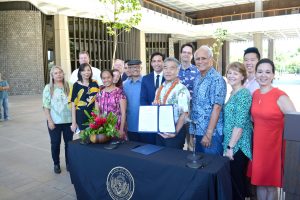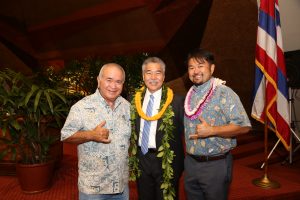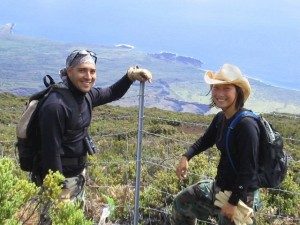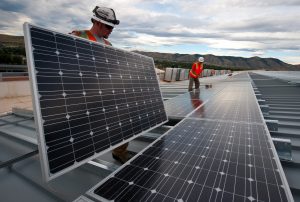To date, we have protected over 40,000 acres of watershed forests on Kauaʻi, Oʻahu, Molokaʻi and Hawaiʻi islands. We helped preserve and protect Turtle Bay lands from development.
A joint agreement with the US Navy is helping us reach our renewable energy goals. And together, we’ve established guidelines to use recycled water on food crops.

Gov. Ige and legislators make Hawai’i the first state in the nation to enact legislation that abides by the Paris Climate Accord.
Working with all of you here in the Legislature, we were able to provide tax credits for organic farmers, which means a healthier people and healthier lands. You passed and I signed a law to abide by the Paris Climate Accord – the first state in the nation to do so. We understand deeply and fully what the future requires of us.
I also fought to give Native Hawaiians a seat at the table when it comes to the management of Papahānaumokuākea National Marine Monument. The Office of Hawaiian Affairs is now a co-trustee of the monument.
Our goal of increasing local food production is another golden opportunity for Hawaiʻi. We are blessed with four growing seasons and a land-grant university with a College of Tropical Agriculture that has a long history of cutting-edge work. With all these factors, Hawaiʻi can and must become the premier center for new agricultural technologies.

Gov. Ige congratulates Hawai’i Island farmer Richard Ha and Smart Yields CEO Vincent Kimura on their efforts to increase local food production.
We already have ag tech startups going strong in Hawai‘i. One company that comes to mind is Smart Yields. They help small and medium farmers to increase their production with data analytics and other tools. The company received international attention when it was chosen to be a part of the Vatican’s first tech accelerator focused on global food production. At this time, I’d like to recognize Smart Yields CEO Vincent Kimura and his mentor, Hawai‘i Island farmer Richard Ha.
What we now need is the driver to make greater local food production possible. There is no better way than through our schools. I applaud the new leadership in the DOE’s Farm to School program, the leadership provided by Lt. Governor Shan Tsutsui, and the great cooperation of the Department of Agriculture and the State’s Procurement Office.
Clean energy is not only critical to air and water quality, it is important to our economy and our wallets as we work to reduce our reliance on imported fossil fuels. Working with the Legislature, I was the first governor to sign into law a bill requiring 100 percent of Hawai‘i’s electricity to come from renewable sources by 2045. Again, this demonstrates what we can accomplish when we work together. As a next step, we will grow a carbon market in Hawaiʻi. This way carbon polluters around the world can invest in restoring Hawaiʻi’s koa and ʻōhiʻa trees to offset their carbon emissions.
We want hydropower, sea water air conditioning, solar and wind energy, biomass and the fullest possible use of our waste streams. We celebrate the Hu Honua Power Plant on the
Big Island as well as the new solar farms on other islands. And this week we will join NRG Energy, Hawaiian Electric and Kamehameha Schools in celebrating three utility-scale solar projects on O‘ahu.
We want the brainpower and the imagination of the world to continue to come here. They can help us find our way to 100 percent renewable energy sources for electricity, and in doing so, help the world find its way to 100 percent. Let us take the billions we export for fossil fuels, spend it here, and then export the energy systems we develop.

